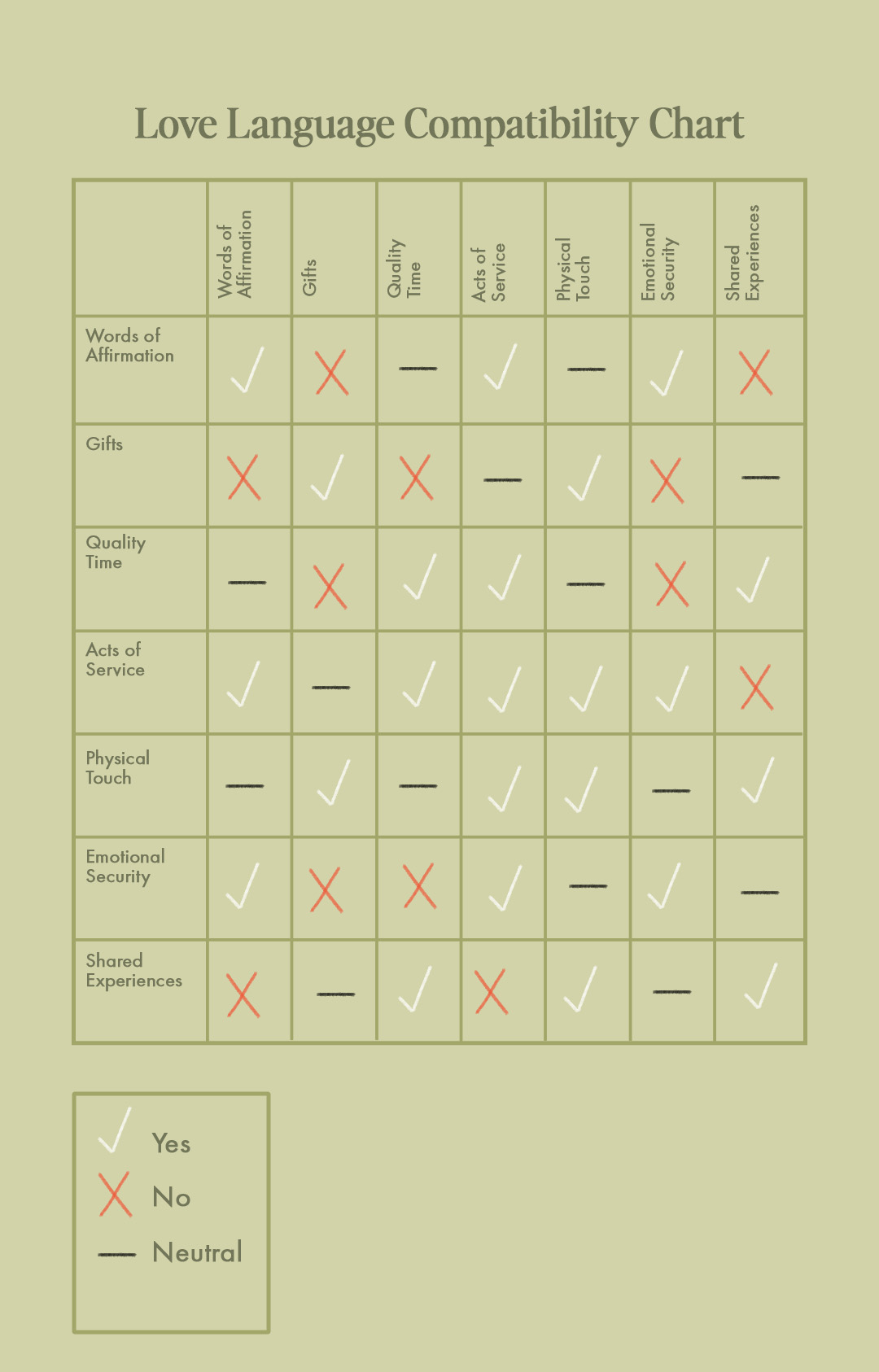There is one book that I can say without a doubt helps me in my relationship every single day, and that is Dr. Gary Chapman’s The Five Love Languages: The Secret to Love That Lasts. And I am not alone in this. The #1 New York Times Bestseller has been helping millions of people strengthen their relationships for over 30 years, and it’s not stopping anytime soon.
There are five original love languages, and two new ones in tow, that describe how individuals like to give and receive love—which is genius—but it begs the question: Can all love languages be compatible? Are some love languages better together than others? And what happens when one person’s love language is so different from their partner’s that they have trouble understanding each other?
You know we love examining compatibility around here, and the two new love languages made us curious to answer these questions. We tapped Jennifer Teplin, LCSW, Founder of Manhattan Wellness, and Laurel House, an eharmony relationship expert, to understand the best and most challenging love language pairings so you can know first-hand what you’re getting yourself into.


The Love Languages, Explained
If you’re not familiar with the concept of love languages, no fear. Finding out which love language you resonate most with doesn’t require taking an annoyingly long quiz (no shade to you, enneagram). With a little self-awareness and reflection, you can decide which one best suits you after reading the explanations below.
Words of Affirmation
Someone with this love language likes it when their partner expresses their affection with praise, appreciation, encouragement, and more through written or spoken words. They feel that communication is key to the security of their relationship, so even a simple “thinking of you” text in the middle of the day or a “see you later!” sticky note left on the counter goes a long way.
Receiving Gifts
Receiving gifts gets a bad reputation as a love language, but it is not any less valid than the others. If this is your love language, the actual gift is a physical representation that your partner is thinking of you, and that means a lot to you. When people say, “It’s the thought that counts,” these are the people who truly mean it.
Quality Time
Those who value quality time as a love language prioritize meaningful time with their partner. This doesn’t mean that they require their partner’s presence at all times, but when they are together, they give their partner their undivided attention and want the same in return.
Acts of Service
If you’re the kind of person who pays more attention to show rather than tell, acts of service could be your love language. Actions speak louder than words in your world, and it goes a long way when your partner does something for you without you having to ask, like running an errand you didn’t have time to do yet or making you dinner just because.
Physical Touch
The love language of physical touch is all about receiving love through touch, physical closeness, and other forms of physical affection. People with this as their love language need to show and feel love and support through hugging, kissing, cuddling, holding hands, having sex, and more similar skin-to-skin interactions.
Emotional Security
Those whose love language is emotional security want to feel emotionally seen and taken care of by their partner. Through honest and vulnerable communication, they are able to reveal their true self and feelings safely to the other person and ultimately, open themselves up to love and be loved by someone else.
Shared experiences as a love language has a focus on adventuring and expanding yourself with someone. If you crave creating memorable experiences with your significant other and feel like it bonds you as a couple, it is likely that this is your love language.
The Most Compatible Love Languages

The Best Relationship Pairings
Even though the majority of complementary pairings are partners with a shared love language, partners have different love languages more often than not. According to Teplin and House, the following love language pairings make for some of the best relationship duos.

These two are all about representing love—whether it be through physical items or service. While their representations are different, they have an understanding. Teplin says that the key to this pairing is for each partner to “avoid focusing on their own physical act and remember their partner’s preference.”

“When we prioritize spending time together in a meaningful way, it can often lead to deeper dialogues and feelings of admiration being shared,” says Teplin. For example, the more uninterrupted quality time you have together, the closer your bond is, and the more likely you are to recognize and affirm each other’s efforts, goals, etc., which in turn, helps these two love languages feed off one another.

Since these two love languages can happen at the same time, they make for a practically perfect (and very sexy) pair. While these couples lean more toward the physical side of things, they are usually just excited and happy to be near one another and do things for each other, no matter the circumstance.

According to House, these two love languages align perfectly. This is because “the person who truly lets you in emotionally will then also allow that person to help them by doing things for them,” (like drawing a bath and rubbing your feet at the end of an emotionally draining day) explains House. On the flip side of that, someone who values Emotional Security “will have the depth of understanding to see the needs of the person who feels loved through the language of Acts of Service,” she adds.

This duo is a given, but their sweet spot is found in doing “connective activities together that deepen the relationship” while they are enjoying their quality time. For example, cuddling on the couch together will make someone whose love language is Quality Time very happy, but that isn’t enough for someone whose love language is Shared Experiences. Instead, they should try a new at-home hobby together, plan a trip, or make reservations at a new-to-them restaurant. These things are more involved quality time, making both parties happy.

“For some Shared Experiences people, it is the intimate time that they share together that makes them feel deeply connected and satisfied, and of course, the Physical Touch people love that intimate Shared Experience,” explains House. What makes this duo fun is their eagerness to push intimacy boundaries—like trying new sex positions or experimenting with role-playing. These create experiences while incorporating physical touch, so it’s a win for both partners.
The Most Challenging Relationship Pairings
While any couple with conflicting love language preferences will take more time to adjust, it doesn’t mean they are doomed. House says that “as long as there are conversations to explain the ‘why’ behind the ‘what,’ understanding can be created, and any two individuals, no matter how different their love languages are, can feel deeply loved, seen, appreciated, and nourished.” So if you and your partner’s love languages are on this list, don’t fret. You can still have a fulfilling and long-lasting relationship if you’re intentional about making each other feel loved.

“While one partner uses their body to express connection, the other’s preference is verbal confirmation,” says Teplin. This leaves these two partners on different sides of the world in their relationship and causes them to try to find a middle ground. While compromise is key here, this pair might not ever feel like they are getting everything that they need from one another because they are so different.

Since a physical gift and the gift of quality time are difficult to compare, “we often see partners with this combination feeling as though their partner does not understand what they value,” says Teplin. For example, a very thoughtful gift doesn’t equate to a memorable evening together and vice versa.

This pairing is challenging because the partner whose love language is Emotional Security doesn’t understand the point of a physical gift. This is because they view it as “just stuff and not something that was purchased because they are so deeply seen for who they are and what they actually need,” explains House. Subsequently, they don’t get their partner (whose love language is Receiving Gifts) gifts very often, which can make the other partner feel neglected.

While this might come as a surprise, this pairing has trouble seeing eye-to-eye. Just because the Emotional Security partner wants to have deep and vulnerable conversations doesn’t mean they need to be with their partner all the time to have them. They don’t have to be long, they just have to be meaningful and that’s enough for them. But the partner whose love language is Quality Time might not feel like they get enough time with their partner—especially lighthearted time that doesn’t involve serious conversations.
 The problem with this duo is that the person doing Acts of Service usually does them alone (such as picking up dinner after their partner had a long day or doing chores for them that they don’t want to do themselves), but that is “completely counter to the thought process of the Shared Experiences person who wants to do the activities, chores, and errands together as a way to connect and bond,” explains House. Meanwhile, when the Shared Experiences person recommends they do chores together, that makes no sense to the Acts of Service person, so it’s not uncommon that they end up misunderstanding one another frequently.
The problem with this duo is that the person doing Acts of Service usually does them alone (such as picking up dinner after their partner had a long day or doing chores for them that they don’t want to do themselves), but that is “completely counter to the thought process of the Shared Experiences person who wants to do the activities, chores, and errands together as a way to connect and bond,” explains House. Meanwhile, when the Shared Experiences person recommends they do chores together, that makes no sense to the Acts of Service person, so it’s not uncommon that they end up misunderstanding one another frequently.

It comes as no surprise that a Words of Affirmation person likes to do a lot of talking, but that doesn’t do much for the person whose love language is Shared Experiences. According to House, “the Shared Experiences person wants to do, go, and experience, and the Words of Affirmation person might feel like they aren’t having conversations of depth and meaning, making them feel like the relationship is superficial and just for fun.”


 "
"
